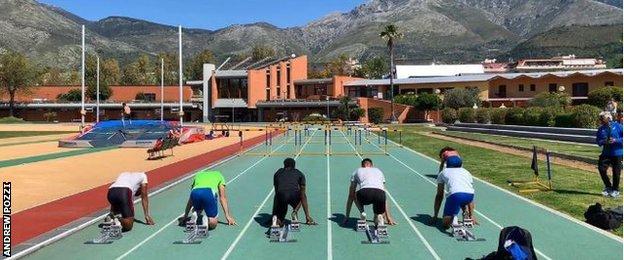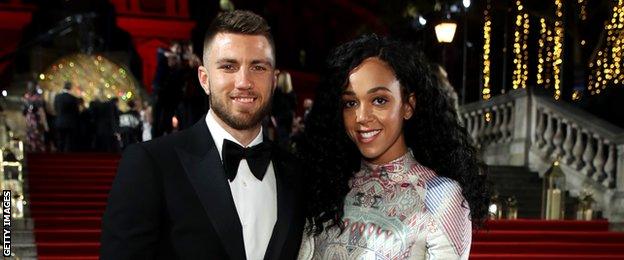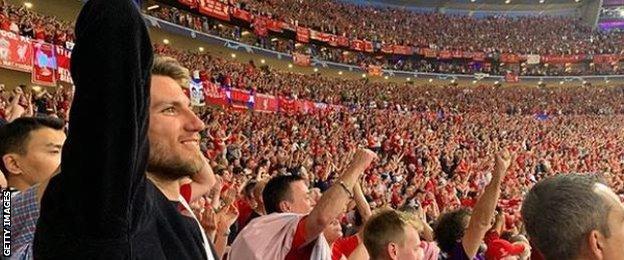
Last autumn, Andrew Pozzi was offered a choice.
Sitting opposite him in a small, Italian seaside town was Santiago Antunez, the diminutive sprint hurdling guru who has previously coached fellow Cubans Anier Garcia and Dayron Robles to Olympic gold.
Pozzi, Antunez explained, had two options.
If they worked together for a few weeks or months, he could fine-tune the British hurdler's speed, smooth off a few ragged edges and wring out a few milliseconds here and there.
Or he could commit.
If Pozzi leapt into the unknown, moved his life wholesale to Formia, on Italy's Mediterranean coast, and attempted to clear language barriers in Italian and Spanish, Antunez would pick apart and rebuild his hurdling technique from the ground up.

Pozzi's new training base in Formia in southern Italy
It came with risks. Hurdling action, like a golf swing, is individual. Swapping what has worked on the track for what works in a textbook is no guarantee of an upgrade.
Pozzi, who thought Antunez had retired and only tracked him down after spotting him in an Italian athlete's social media post, had no doubts.
"I said, all things being well, I want to be here for the Olympics and beyond," the 27-year-old tells BBC Sport.
The athlete, who won 60m hurdles gold at the 2018 World Indoor Championships in Birmingham, vacated his rented house in Loughborough, sold what possessions he couldn't store with his parents and set up camp in southern Italy.
As well as getting to grips with a new coach and training group, he has been adjusting to life off the track, 1,200 miles from home.
"I am a big fan of Italian food so have had to watch portion control a little bit when I am eating out," he says.
"I have my car with me, thanks to my kind parents who drove it over from the UK, but I don't use it so much.
"It is interesting being overtaken three or four times in the space of 400m while you are driving the speed limit!
"It's funny the things you miss about the UK. When I have come back for a visit, I would find myself watching cooking shows and daytime TV, which I would never have watched before in my life, just for the background sound of English chit-chat."

Pozzi is not the only British athlete to administer culture-shock therapy to their training by moving abroad.
Sprinters Matthew Hudson-Smith, Nethaneel Mitchell-Blake and CJ Ujah are among those to have crossed the Atlantic in search of new ideas. Adam Gemili moved to the Netherlands to work with Dafne Schippers' American coach Rana Reider.
Pozzi's girlfriend Katarina Johnson-Thompson made the decision to base herself in the south of France and was rewarded with a European heptathlon silver medal last August and victory at the Gotzis meeting this May.
"Of course, we spoke about it and I think was relatively well prepared for some of the challenges," Pozzi adds.
"Whenever you live away and you have family, friends, loved ones or relationships in other countries, it requires a better level of organisation.

Andrew Pozzi and Katarina Johnson-Thompson attend The Fashion Awards at the Royal Albert Hall in December
"I would say that does not come naturally to me, but since I have been out here, I have had to work a lot harder.
"One of the benefits of what we do is that we end up attending a lot of the same competitions and are in the same place for several days.
"But it is important to remain balanced as a person. It is very easy to lose that as an athlete, especially when you are working in a foreign country. You have to be happy on and off the track to do your best job."

Pozzi takes in the Champions League final in Madrid
He and Johnson-Thompson were certainly happy as they took in Liverpool's Champions League victory over Tottenham in Madrid last Saturday and Pozzi believes the benefits from his winter work with Antunez will reveal themselves as the season builds towards September's World Championships in Doha.
"I was racing under a much higher workload and was relatively fatigued in Shanghai," he says of his sixth-place finish in last month's Diamond League meeting.
"My time was competitive but whenever you make big changes, it is going to take several races for it to become habitual.
"It is just finding the rhythm at high intensity and races are the only place you can practice that. I have quite a demanding schedule but we are happy with that."
Next up, he will test himself against Sergey Shubenkov - the fastest man in the world last year - in Rome on Thursday night. A meeting with world and Olympic champion Omar McLeod at July's Anniversary Games in London is also in the diary.
As those races jostle for space with technical sessions, language course binges and continental mini-breaks, it is looking like a long and busy year. Just as Pozzi intended.